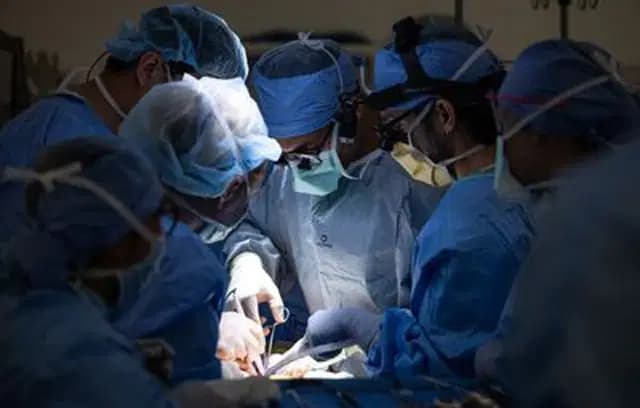In a groundbreaking achievement that has sent ripples through the medical community, surgeons at Ronald Reagan UCLA Medical Center in Los Angeles, California, have successfully performed the world’s first human bladder transplant. This historic procedure, conducted on May 4, 2025, marks a monumental step forward in urological medicine, offering hope to countless patients suffering from severe bladder dysfunction. The surgery, detailed in a recent article by Vanguard News, represents years of research, innovation, and collaboration between top medical institutions. In this blog post, we’ll dive deep into the details of this pioneering operation, its implications for the future, and the remarkable story of the patient at the heart of this medical milestone.
The Patient: A Story of Resilience
At the center of this historic procedure is 41-year-old Oscar Larrainzar, a father of four whose life was profoundly impacted by bladder cancer and end-stage kidney disease. Diagnosed years ago, Larrainzar’s battle with cancer led to the loss of most of his bladder and both kidneys, leaving him reliant on dialysis for seven years. Dialysis, while life-sustaining, is a grueling process that significantly limits quality of life, requiring patients to spend hours tethered to machines multiple times a week. For Larrainzar, the inability to urinate normally and the physical and emotional toll of dialysis underscored the urgent need for innovative solutions.
The bladder, a hollow organ responsible for storing and expelling urine, is critical to the body’s urinary system. When it is damaged or removed due to conditions like cancer, congenital abnormalities, or severe infections, patients often face significant challenges, including the need for external drainage systems or reconstructive surgeries using intestinal tissue. These alternatives, while functional, come with complications such as infections, obstructions, and an increased risk of cancer over time. For patients like Larrainzar, a bladder transplant could represent a transformative alternative, restoring natural function and improving quality of life.
The Procedure: A Surgical Triumph
The world’s first bladder transplant was an eight-hour surgical marathon performed by a team of highly skilled urologists, led by Dr. Nima Nassiri of UCLA Health and Dr. Inderbir Gill of the Keck School of Medicine at the University of Southern California (USC). The procedure was a complex orchestration of precision, innovation, and collaboration, involving the transplantation of both a kidney and a bladder from a deceased donor. This dual transplant was necessary because Larrainzar’s condition affected both organs, and the surgery aimed to restore full urinary system function.
The operation began with the transplantation of the kidney, a well-established procedure in modern medicine. Once the kidney was successfully connected and functioning, the surgical team moved on to the bladder transplant—the first of its kind in human history. The bladder was meticulously connected to the patient’s urinary system using a novel surgical technique developed through years of research and preclinical studies. This technique, pioneered by the team at Keck Medicine of USC and UCLA Health, addressed the unique challenges of transplanting a hollow organ like the bladder, which requires precise vascular and muscular connections to ensure proper function.
One of the most remarkable outcomes of the surgery was the immediate functionality of the transplanted organs. The kidney began producing urine during the procedure, a critical sign of success, as it eliminated Larrainzar’s need for dialysis. Within days, he was able to urinate normally for the first time in years, a moment that Dr. Nassiri described as a “game-changer” for both the patient and the medical team. This rapid return to normal urinary function underscores the potential of bladder transplantation to transform lives.
The Science Behind the Breakthrough
The road to this historic surgery was paved with years of rigorous research and innovation. Unlike solid organs like the kidney or liver, which have been successfully transplanted for decades, the bladder presents unique challenges. As a hollow, muscular organ, it requires precise surgical techniques to ensure proper blood supply, nerve function, and integration with the ureters and urethra. The team at Keck Medicine and UCLA Health spent years refining their approach, conducting preclinical studies to develop a method that could overcome these hurdles.
The procedure itself is part of a clinical trial designed to evaluate the feasibility and long-term outcomes of bladder transplantation. While the immediate success of Larrainzar’s surgery is promising, researchers are cautious about the unknowns that remain. For example, the long-term functionality of a transplanted bladder—its ability to store and expel urine effectively over time—is still under investigation. Additionally, patients who receive organ transplants must take immunosuppressive medications to prevent rejection, which carry risks such as infections and other complications. The clinical trial aims to assess how these factors play out in bladder transplant recipients, with Larrainzar’s case serving as a critical first data point.
The collaboration between UCLA Health and Keck Medicine of USC was instrumental in bringing this procedure to fruition. Dr. Inderbir Gill, a renowned urologist and pioneer in minimally invasive and robotic surgery, emphasized the interdisciplinary effort required to achieve this milestone. “This is a culmination of years of hard work, innovation, and teamwork,” he stated in the Vanguard News article. The success of the procedure highlights the importance of academic medical centers in pushing the boundaries of what is possible in healthcare.
Implications for the Future
The successful completion of the world’s first bladder transplant opens the door to a new frontier in transplant medicine. For patients with severe bladder dysfunction—whether due to cancer, congenital conditions like spina bifida, or chronic infections—this procedure could offer a life-changing alternative to current treatments. Traditional approaches, such as creating a neobladder from intestinal tissue or using external catheters, are often associated with significant complications and limitations. A bladder transplant, by contrast, has the potential to restore natural urinary function, improving both physical health and quality of life.
The clinical trial at Keck Medicine and UCLA Health plans to include four more bladder transplant surgeries, which will provide additional data on the procedure’s safety and efficacy. If successful, these trials could pave the way for bladder transplantation to become a standard treatment option, much like kidney or liver transplants are today. Beyond urology, this breakthrough could inspire further research into the transplantation of other hollow organs, such as the stomach or intestines, expanding the possibilities of transplant medicine.
However, challenges remain. The need for lifelong immunosuppression is a significant consideration, as it increases the risk of infections and other health issues. Researchers are also exploring ways to minimize these risks, such as developing more targeted immunosuppressive therapies or leveraging advancements in regenerative medicine to grow bioengineered bladders. These innovations, while still in their early stages, could further revolutionize the field in the coming decades.
A New Chapter for Oscar Larrainzar
For Oscar Larrainzar, the bladder transplant represents more than a medical milestone—it’s a second chance at life. After years of enduring the physical and emotional burdens of dialysis and bladder dysfunction, he can now look forward to a future free from these constraints. The ability to urinate normally may seem like a small victory to some, but for Larrainzar and his family, it’s a profound gift. As a father of four, he can now focus on being present for his children and rebuilding his life with renewed hope.
Larrainzar’s story is a testament to the resilience of the human spirit and the power of medical innovation to transform lives. His willingness to participate in this groundbreaking clinical trial not only changed his own trajectory but also paved the way for future patients to benefit from this procedure.
Looking Ahead
The world’s first bladder transplant is a landmark achievement that underscores the potential of modern medicine to tackle even the most complex challenges. As the clinical trial progresses and more patients undergo this procedure, we can expect to learn more about its long-term potential and limitations. For now, the success of Oscar Larrainzar’s surgery serves as a beacon of hope for those living with bladder dysfunction and a reminder of the incredible strides being made in transplant medicine.
At http://healthyclicking.com, we’ll continue to follow this story and other groundbreaking developments in healthcare. If you found this post insightful, share it with your network and join the conversation about the future of medicine. Together, we can celebrate the innovations that are changing lives and shaping a healthier tomorrow.
Join our Whatsapp channel to stay updated always!


